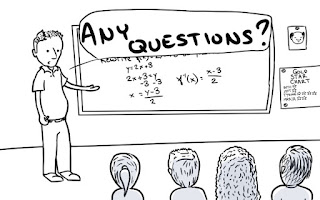 |
| https://funnyjunk.com/channel/oc-comic-makers/Any+questions+class/aYskLnL/ |
When I served as a State FFA Officer I was trained to ask, "What questions are there?" instead of "Are there any questions?". This made sense to me and I always did my best to follow through with it but I never put too much thought into it.
As a preservice teacher though, I am quickly understanding the benefit and importance of asking effective questions in the classroom. Let's break down some of the characteristics of effective and ineffective questions.
Cornell's Center for Teaching Innovation shares some of the following tips on designing effective questions.
- Write questions directed towards your learning objectives.
- Know what level of cognition you are trying to target and write your questions accordingly.
- Ask why! Having students explain their reasoning can enforce concepts for them and can help you to understand their train of thought.
- And my own personal tip; BECOV is life!!
- Use clarity in your questioning.
- Make sure questions are related to your objectives.
- Use variability in the type of questions you ask.
So, what questions are there?
References
Cornell University Center for Teaching Excellence. (2015). Using Effective Questions. Retrieved from
http://www.cte.cornell.edu/teaching-ideas/engaging-students/using-effective-questions.html

Victoria, BECOV is indeed life and can be an asset to effective questioning. You give great tips for using questioning, but my question is, how do you plan to apply them during your student teaching internship or in your lab demos for 412?
ReplyDeleteVictoria,
ReplyDeleteI'm glad that you included a chart that highlights the characteristics of effective and ineffective questioning!
I really like how you tied BECOV into this, I never thought of it that way. I agree that I learned a lot from state office but really am able to understand the reasoning behind it now.
ReplyDeleteVictoria, I remember vividly one of the best compliments I received after both formal and informal principal observations was how I used questioning. In particular, when a student asked me a question, instead of just answering them I naturally would begin asking them leading questions to direct them to the answer themselves, rather than just doing the thinking for them. Very important to achieve higher levels of thought.
ReplyDeleteVictoria, I really appreciate how you tied in your State officer experience with asking effective questioning. I also like how you included the chart with the ineffective and effective characteristics of questioning! My question to you: How do you plan to utilize this chart and the qualities of effective questions with your students at Penns Manor?
ReplyDelete